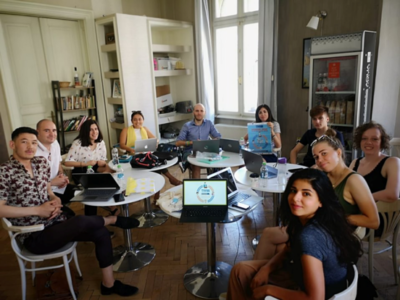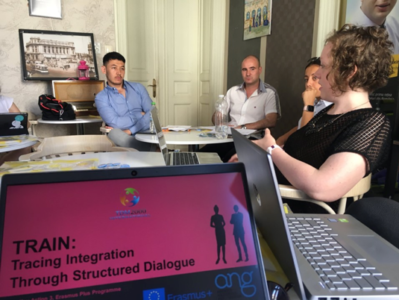Bucharest Calling: – “Tracing Integration Policies Through Structured Dialogue”
The Centre For European Progression goes to Bucharest
Source: Tracing Integration Policies Through Structured Dialogue
We recently had the chance to go to Bucharest, where we met up with our partners from across Europe. NGOs from Italy, Bulgaria, Malta, Romania, Finland, Austria, Portugal and Estonia, as well as CFEP from Belgium, are all represented in the TRAIN – Tracing Integration Policies Through Structured Dialogue project.
This project comes under Key Action 3 of the Erasmus+ Programme, and seeks to use the Structured Dialogue method to develop recommendations on migrant integration policies following input from young people.
To cut through the Euro-jargon, what this means in practice is that there are three Key Actions in the Erasmus+ scheme and all funded projects have to come under one of those umbrellas. Our project falls under number 3 – Support for Policy Reform – as it seeks to gather young people’s views on how to reform integration policy.
This is where the Structured Dialogue comes in. The European Commission wants to work with civil society organisations to hear from young people themselves. The Structured Dialogue takes place in cycles of three Council presidencies, lasting 18 months. The current cycle involves the Romanian, Finnish and Croatian presidencies and has a particular theme – ‘Creating opportunities for youth’. Each EU country carries out a national consultation of young people and youth organisations during the 18-month period. The participating organisations’ role is to provide a more direct link between youth and European policy making, by holding discussions with young people in their respective communities in order to hear their views and experiences surrounding migration and integration.
The closing event will be held in Brussels in June 2020, organised by the CFEP. This is when the results of the dialogues will be submitted to the European Commission, in the form of concrete policy recommendations.
Over the last few days, CFEP and our partners met to discuss the Structured Dialogue, the project actions and best practices on integration from our countries. It was particularly interesting to hear about our partners’ experiences. For example, our Finnish partners have a number of members with a refugee background, and our Estonian partners have a dance company as part of their NGO and are working on connecting Estonian and Russian speaking communities. In Austria, our partners have discovered that young people need time and explanations in order to confidently take part in policy discussions. Finally, in Malta, our partners have experienced a disparity in treatment of migrants based on their wealth and their country of origin. Equally, they found it interesting that in Belgium, integration courses are mandatory for most non-EU newcomers.
Source: Tracing Integration Policies Through Structured Dialogue
Our next steps as a group are to discover more about how these different policies work on the ground, and to develop recommendations for Europe as a whole based on the views and experiences of young people.
If you or your organisation wish to participate in this project, please contact hannah.bettsworth@c4ep.eu.


